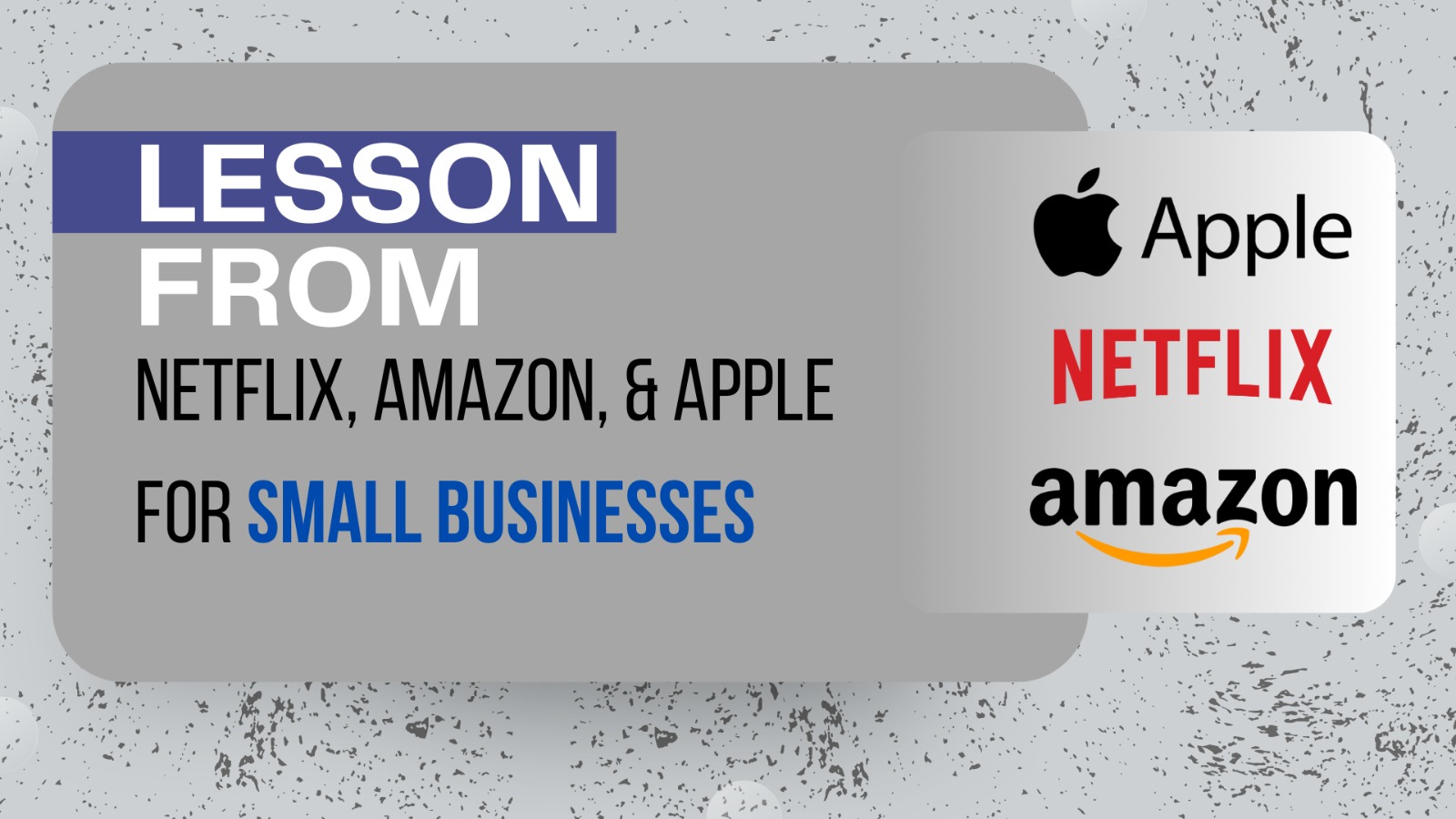Lessons from Netflix, Amazon, and Apple for Small Businesses

Strong 8k brings an ultra-HD IPTV experience to your living room and your pocket.
Small businesses should not rely on tried-and-tested approaches. They must turn to those who excel in growth and customer-centric culture. Netflix, Amazon, and Apple not only transformed their industries; they became benchmarks for customer experience, scale, and digital evolution.
While small businesses may not have the same financial resources, they can adopt the mindsets, tools, and strategies that were keys to these giants' success. In the following sections, we will explore what small businesses can learn from Netflix, Amazon, and Apple and transform strategies into business models, innovations, brand loyalty, and customer relations.
Focus On Scalable and Customer-Centric Models
Small businesses should aim to adopt platform-driven models; perhaps the most significant takeaway to draw from these tech giants is their strategy to use platform-based business models. Take Amazon, for example, who used to only sell books. Now, they offer everything and even allow third-party vendors to sell their merchandise on the platform. This diversification of revenue enabled small business emulation through partnerships and strategic outsourcing.
Through direct-to-consumer sales, Netflix circumvented traditional distribution models and generated stable subscription revenue. Small businesses can mimic this model through retention strategies involving curated boxes, membership clubs, or ongoing service contracts.
We can gain further insight by examining Apple's strategy on vertical integration, whereby they also control services and software. While smaller players may not achieve full integration, regaining control of crucial customer interaction points enhances the customer journey.
Deliver Optimal, Effortless, and Tailored Customer Engagements
From Apple's mobile-first interfaces to Amazon's effortless checkout, every user interaction is precisely tailored and strategically thought out.
Small businesses can also strive to enhance user experience:
• Anticipate customer needs by employing predictive analytics.
• Tailor offers and recommendations through AI-driven insights.
• Markets hyper-personalization to create the illusion of unique interactions at every juncture.
A customer feedback loop, where insights from customers shape changes and improvements, is yet another method to fulfil and enhance a customer's journey.
Embrace Innovation and Agile Product Development
Introducing new products isn't the sole focus of innovation; it is also about integrating continuous iteration into product development as well as fostering a culture of experimentation within the company.
Netflix employs a rapidly iterative new product development model called fail-fast. Amazon is famous for its customer feedback loops and MVP testing. Apple focuses on product lifecycle management through consistent incremental improvements instead of radical changes.
Small businesses can also focus on:
• Rapid ideation by adopting the lean startup methodology.
• Cross-functional problem-solving through dedicated innovation teams.
• Early adopter campaigns aimed at cultivating loyal advocates.
When businesses adopt design thinking, even the most modest of teams can creatively address evolving customer challenges. The objective is elusively simple: solve challenges as promptly and efficiently as possible.
Build Strong Brands That Resonate
Branding is often mischaracterized as exclusively the domain of marketing; rather, it serves as a core element of any business strategy. Counter to expectations, Apple was fashioned into a cult brand by leveraging emotional branding strategies coupled with product-centric branding. Everything from rigid packaging to advertising speaks with unwavering clarity and unyielding confidence and consistency.
Small businesses are not precluded from pursuing these strategies:
• Create emotional connections with your customers through brand storytelling.
• Establish trust using consistent brand messaging across channels.
• Avoid underpricing offerings by studying the psychology behind premium pricing.
Netflix and Amazon do not rely heavily on premium pricing but have established strong customer followings through loyalty milestones and value-driven, customer-first communication. Whether pursuing low-cost or mass appeal, clear market positioning is essential.
Smart Leverage of Data
Amazon thrives because of its mastery over real-time data analytics and smart inventory management. Content delivery at Netflix is fine-tuned using machine learning personalization. The apparent lack of discussion around Apple's product development success belies the critical role of data, even if subtly leveraged.
Small businesses can start by:
• Tracking behavioural patterns and forecasting demand with predictive customer analytics.
• Reducing manual work through e-commerce automation.
• Supporting digital operations with cloud-native infrastructure.
Perfect the Strategy of Subscription and Retention
Netflix and Amazon Prime have demonstrated the power of subscription models. These models not only create recurring revenue but also deepen commitment and brand affiliation.
Key tactics include:
• Retaining subscription members by maintaining continuous value delivery.
• Implementing tiered membership plans for users (similar to Amazon Prime) boosts value perception.
• Personalized offers and upgrades help in reducing subscriber churn.
These strategies are easily adaptable in small businesses through curated monthly workshops, bundled products, or exclusive digital materials.
Digitally Optimize Your Small Business Operations and Supply Chains
Amazon's competitive advantage stems from the optimization of its supply chain and zeal for logistics. A competitor's order fulfilment speed is outpaced only by Amazon due to its smart inventory and order management systems alongside its e-commerce automation solutions.
Even small businesses without vast logistics networks can:
• Employ automated inventory-level tracking systems.
• Outsource fulfilment.
• Sync online shops with up-to-date inventory systems.
Apple's robust control over the supply chain ensures quality and delivery. Small businesses can cultivate provider partnerships that respond to customer needs flexibly and reliably while providing satisfaction.
Foster Protective and Innovative Organizational Culture
Core values drive each innovation at Apple, Netflix, and Amazon. These companies embrace autonomy, experimentation, and learning, supported by a value-based framework.
• Netflix provides companies with the ability to execute decisions, often resulting in innovative outcomes independently.
• Calculated risks are welcomed through Amazon's fail-fast approach to experimentation.
• Apple encourages creativity through collaborative frameworks that span multiple departments.
Small businesses are able to foster:
• Ownership with processes that empower employees.
• A clearly articulated strategy leads to cohesive visionary leadership.
• This serves as roadmap-aligned guiding principles for responsive changes at the agile business evolvement centre.
• Cultural synergies often provide better innovation with stronger teams.
Establish an Omnichannel Presence
Demanding consumers today expect seamless interactions with a brand across all touchpoints. Amazon has pioneered seamless continuity in omnichannel retail from Alexa to mobile and even physical stores.
While supporting expansion from e-commerce to social media, small businesses can build omnichannel strategies by:
• Email social web integrated experience.
• Consistent online and offline service.
• Engaging on-the-go users through mobile-exclusive interfaces.
Think Big, Act Smart
The smart strategies leading to relentless innovation alongside unwavering customer value focus drive the success of Netflix, Amazon, and Apple. Small businesses do not need to emulate these lessons with billion-dollar budgets. All it takes is a customer-first ethos, a willingness to experiment, and disciplined, purposeful execution.
Adopting tactics such as:
• Business strategy based on platforms.
• Marketing hyper-personalization.
• Iterative enhancement of products.
• Retention of subscriptions.
• Optimized digital supply chains.
• An innovation-driven culture.
While these corporations have reached scale, their foundational ideas remain within reach. Adopting them will make small businesses far more agile, customer-centric, and resilient.
Note: IndiBlogHub features both user-submitted and editorial content. We do not verify third-party contributions. Read our Disclaimer and Privacy Policyfor details.


